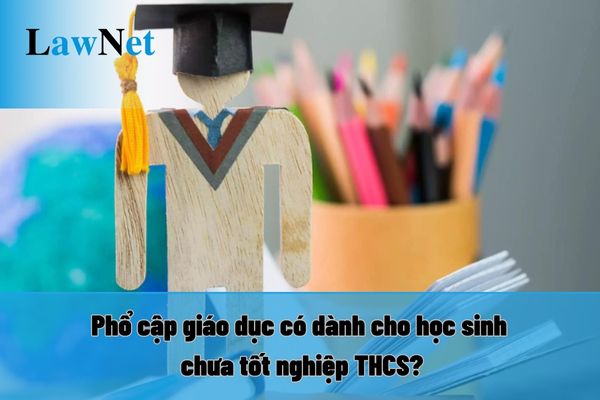Do students who have not graduated from lower secondary school in Vietnam need to attend educational universalization?
Do students who have not graduated from lower secondary school in Vietnam need to attend educational universalization?
According to the provisions of Article 12 of Decree No. 20/2014/ND-CP, the subjects of lower secondary educational universalization are as follows:
Subjects of lower secondary educational universalization
The subjects of lower secondary educational universalization are youths and teenagers from 11 to 18 years old who have finished the primary educational program but not yet finished the lower secondary educational program.
The subjects of lower secondary educational universalization are youths and teenagers from 11 to 18 years old who have finished the primary educational program but not yet finished the lower secondary educational program.
Thus, according to the above regulation, students who have not graduated from lower secondary school are required to undergo educational universalization.
Is educational universalization available to everyone in Vietnam?
According to Article 14 of the Education Law 2019, universalization of education and compulsory education are stipulated as follows:
- Primary education is compulsory.
The State shall provide the universalization of preschool education to 05-year-old children and provide the universalization of lower secondary education.
- The State shall be responsible for implementing compulsory education throughout the country; planning and facilitating the universalization of education.
- All citizens within defined age groups shall have the obligation to learn in order to contribute to the universalization of education and complete the compulsory education programme.
- Families and guardians shall enable their members in defined age groups to receive education in order to contribute to the universalization of education and complete the compulsory education programme.
According to the regulations, the law clearly states that every citizen within the prescribed age group has the obligation to study to fulfill educational universalization.
Thus, not everyone will undergo educational universalization but only those subjects specified in Article 12 of Decree No. 20/2014/ND-CP. To be specific, youths and teenagers aged 11 to 18 who have completed primary education but have not graduated from lower secondary school, will be eligible for educational universalization.

Is compulsory education available to students who have not graduated from lower secondary school? Is compulsory education available to everyone? (Image from the Internet)
What standards must a commune in Vietnam meet to be recognized standard achievement of lower secondary educational universalization at level 3?
According to Article 16 of Decree No. 20/2014/ND-CP, the criteria for recognized standard achievement of secondary educational universalization at level 3 are as follows:
Criteria for recognized standard achievement of secondary educational universalization at level 3
1. For communes:
a) Ensuring criteria for recognized standard achievement of secondary educational universalization at level 2;
b) The percentage of youths and teenagers from 15 to 18 years old graduating from secondary educational level must reach at least 95% and 90% for extremely difficult social-economic conditions.
c) The percentage of youths and teenagers from 15 to 18 years old attending the general educational program or continuing educational program at high school level or vocational education must reach at least 80% and 70% for extremely difficult social-economic conditions.
2. For districts: There must be 100% of communes recognized to have met the standard of secondary educational universalization at level 3.
3. For provinces: There must be 100% districts recognized to have met the standard of secondary educational universalization at level 3.
To be recognized standard achievement of lower secondary educational universalization at level 3, a commune must meet the following standards:
Standard 1: Ensure the criteria for recognizing the achievement of standard level 2 of lower secondary educational universalization;
Standard 2: The rate of youths and teenagers aged 15 to 18 graduating from lower secondary school is at least 95%, for communes with particularly difficult socio-economic conditions, the rate is at least 90%;
Standard 3: The rate of youths and teenagers aged 15 to 18 studying in general education programs or continuing education at upper secondary level or vocational education is at least 80%, for communes with particularly difficult socio-economic conditions, the rate is at least 70%.
Criteria for recognized standard achievement of secondary educational universalization at level 2 is stipulated in Article 15 of Decree No. 20/2014/ND-CP as follows:
Criteria for recognized standard achievement of secondary educational universalization at level 2
1. For communes:
a) Ensuring the criteria for recognized standard achievement of secondary educational universalization at level 1;
b) The percentage of youths and teenagers from 15 to 18 years old graduating from secondary educational level must reach at least 90% and 80% for extremely difficult social-economic conditions.
...
Criteria for recognized standard achievement of secondary educational universalization standard at level 1 is stipulated in Article 14 of Decree No. 20/2014/ND-CP as follows:
Criteria for recognized standard achievement of secondary educational universalization standard at level 1
1. For individuals: Granted with Certificate of secondary education.
2. For communes:
a) Ensuring the criteria for recognized standard achievement of secondary educational universalization standard at level 1 and criteria for recognized illiteracy eradication standard at level 1;
b) The percentage of youths and teenagers from 15 to 18 years old graduating from secondary educational level must reach at least 80% and 70% for extremely difficult social-economic conditions.
...
Thus, according to all the above regulations, for a commune to achieve the standard achievement of secondary educational universalization at level 3, it must first meet the criteria for recognized standard achievement of secondary educational universalization standard at level 1 and level 2.

